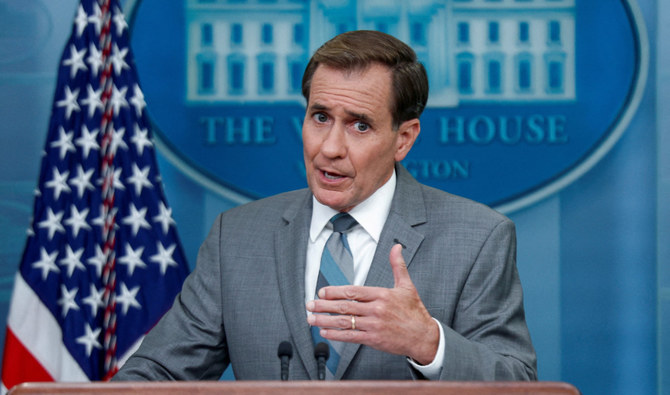
- ARAB NEWS
- 06 Jul 2025

WASHINGTON: The White House stressed on Friday that there would be restrictions on what Iran could do with any funds unfrozen under an emerging agreement that has led to the release of five Americans from prison to house arrest in Tehran.
White House spokesperson John Kirby told reporters that the United States would have “full visibility” into where any released Iranian funds are directed and used. An estimated $6 billion in Iranian assets are now held in South Korea.
“Essentially, the funds can only be accessed for food, medicine, medical equipment that would not have a dual military use,” he said. “And there will be a rigorous process of due diligence and standards applied with input from the US Treasury Department.”
The five Americans will be allowed to leave Iran after the funds are unfrozen, a source familiar with the matter told Reuters.
While stressing that negotiations are ongoing and “the deal is not done,” Kirby said there would be “no impediment” to the transfer of the restricted account from South Korea to Qatar, where Iran would then be able to access the funds.
The potential transfer has drawn Republican criticism that President Joe Biden, a Democrat, is effectively paying a ransom for the US citizens. Moreover, they contend that allowing Iran to use the money for humanitarian goods could free up funds for its nuclear program or to back militias in nations such as Iraq, Lebanon and Yemen.
US Secretary of State Antony Blinken insisted on Thursday that the deal does not mean that Iran would be getting any sanctions relief.
As a first step in what may be a complex set of maneuvers likely to take weeks, Iran allowed four detained US citizens to move into house arrest from Tehran’s Evin prison on Thursday. A fifth was already under home confinement.
Under the deal, the United States would release some Iranians from US prisons, Iran’s mission to the United Nations said.
On Friday, the Wall Street Journal cited people familiar with the matter as saying Iran has significantly slowed the pace at which it is accumulating near weapons-grade enriched uranium and has diluted some of its stockpile.
Kirby said he could not confirm the report but said “any steps that Iran might take to slow down enrichment certainly would be welcome.”
“We’re not in active negotiations about the nuclear program,” he added. “But certainly those sorts of steps, if they were to be true, would be welcome.”
Tensions have boiled since then-US President Donald Trump, a Republican, withdrew from a 2015 nuclear deal designed to curb Iran’s atomic program. Negotiations between the Biden administration and Iran for resumption of the accord have failed. Iran has denied it is seeking a nuclear weapon.
Reuters